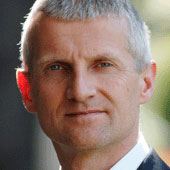How We Solve the World’s Triple Unsustainability Crisis
How can alternative energy sources put human development onto a sustainable path?
August 31, 2011

We are living in an era of global “triple unsustainability” — economic, social and environmental. The indisputable evidence is on the front pages every morning: the never-ending aftershocks from the financial crisis of 2007-09, events like this year’s North African rebellions and the now undeniable, acute effects of global warming.
Taken together, it represents a new reality that simply can’t be wished away — a reality of unsolved problems crying out for new and fundamental solutions, not the same old Band-Aids that only mask the wound.
First, the global economy is on an unsustainable path. It must necessarily grow. Otherwise, it could not generate the proceeds to pay back the enormous debts accumulated by most Western countries. Like a plane, if the economy slows too much, it will stall and crash.
The global GDP growth of recent decades came largely from demographic growth and productivity increases — themselves products of globalization and information technology. Along with these came inevitable, irrational financial exuberance. If we learned anything from recent experience, perhaps it is to properly recognize and fear bubbles for what they are: economic illusions that create no real value, but leave behind a mountain of debt.
We can no longer look to population growth for natural economic growth. Before the end of 2011, there will be seven billion people on this planet. When I was born 47 years ago, the number stood at less than half that.
In less than five decades — roughly one one-hundred-millionth of the time earth has existed — humanity doubled its presence. That is staggering, and almost unthinkable. We can’t keep growing like this, because our planet’s resources simply cannot support it.
For productivity growth to resume as required, we will need an entirely new technological revolution. The Russian economist Nikolai Kondratiev theorized that the economy runs in 54-year-long macro cycles, characterized by distinct technological eras. The current one is the information era, which started in the mid-1970s with the boom of the first commercially viable personal computers.
It peaked with the Internet bubble of the late 1990s and early 2000s, the bursting of which mired us in a “decade of nothing.” If we buy into Kondratiev’s notions, we have approximately 15 more years of global economic dependence on information technology, before a new, growth-inducing technological era begins.
Second, our society is on an unsustainable path because of uncontrolled demographic growth. Ethology, the science of animal behavior, holds that the higher the density of a population, the more selfish and aggressive its members’ behavior.
As logic would suggest, the reality of finite resources, noted earlier, is a driving force. Moreover, the mass urbanization that has come with (and to a degree, helped perpetuate) the past half-century’s population explosion amplifies the effects of increasingly frequent economic crises, and of ongoing climate change.
Finally, the environment is on an unsustainable path because our economy is based on combustion. Most of our consumption involves fossil fuel combustion, directly or indirectly. It doesn’t start and end with fueling our cars, heating our homes or even running our factories.
Over millions of years, the earth adapted to sequester carbon in its solid state, because in gaseous form, carbon is a greenhouse gas that prevents life from developing. The process naturally occurs through the carbon cycle — underground as gas, oil or coal, and above ground as vegetation.
However, our explosive demographic growth and addiction to fossil fuels have, over mere decades, conspired to transform carbon back into the treacherous gas that took the earth millennia or more to fix in a safe, solid state.
The resulting bad news is well documented, in the degradation of our atmosphere, but also of our forests and oceans, where the carbon cycle begins. From a purely logical standpoint, global warming is the only outcome that can ensue, along with all of its negative effects.
So, in order to survive on this planet, humanity has three huge problems to solve: get rid of fossil fuels, stop the demographic expansion and introduce a revolutionary technology that can save the economy. Is there a common denominator? Fortunately, yes. And in that commonality exist solutions already in our grasp.
Making renewable energies feasible on a mass scale is the problem that technology needs to solve. Simply acknowledging this is a huge first step, because it guides our search, and even predicts the economic boom that will follow.
The introduction of any feasible new technology creates a “first adoption demand” much bigger than the subsequent “substitution demand” of the same good. This is how the boom in the initial phase of the renewable energy cycle will create many jobs and raise disposable income, even in poor countries. And because population tends to grow inversely with per capita GDP, demographic growth will slow as well.
The primary renewable energy is solar, which can be used to produce not just electricity, but also zero-emission fuels like hydrogen, methane, biofuels and others. There are copious amounts of energy in the sun — much more than we can consume.
Not only has solar energy been identified as a solution, but resources have already been directed toward it, and production has already proven feasible. To accelerate the revolution, we need a bold, coordinated international policy.
This opportunity must be presented as one simple, clear goal for our global community and for global governance. Financing can come from simply reallocating a portion of the enormous budgets that help sustain the financial sector. The ensuing value created will be real and lasting.
Unlike the obsessive and misguided focus on financial “innovation,” this value creation will not be subject to bursting upon a mere pinprick.
Editor’s note: This essay was adapted from the author’s presentation at the 2011 Salzburg Trilogue. Hosted by the Bertelsmann Stiftung, the Salzburg Trilogue facilitates international cultural dialogue by bringing together recognized public figures to consider matters of global importance.
Takeaways
In less than five decades, humanity doubled its presence. That is almost unthinkable.
Let's get rid of fossil fuels, stop the demographic expansion and introduce a revolutionary technology that can save the economy.
There are copious amounts of energy in the sun — much more than we can consume.
Read previous
In Chile, Dissent Has a Woman’s Face
August 30, 2011
